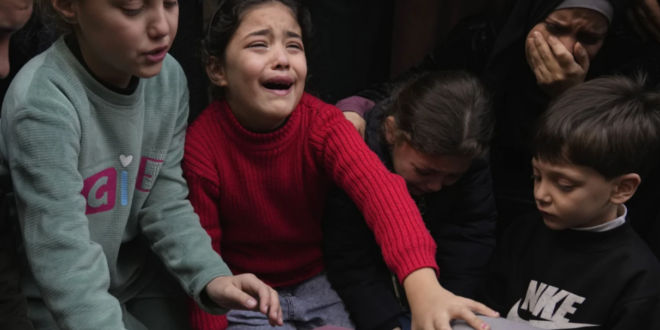Muhamad Yehia
A growing number of Israeli soldiers have started to speak out against the 15-month conflict in Gaza and are refusing to serve, saying they saw or did things that crossed ethical lines.
While the movement is small – some 200 soldiers signed a letter saying they’d stop fighting if the government didn’t secure a ceasefire – soldiers say it’s the tip of the iceberg and they want others to come forward.
The group behind the refusal letter, Soldiers for the Hostages, is trying to garner momentum, holding an event earlier this month in Tel Aviv and gathering more signatures.
A panel of soldiers spoke about what they’d seen in Gaza. Organizers distributed poster-size stickers with a Martin Luther King Jr. quote: “One has a moral responsibility to disobey unjust laws.”
Seven soldiers who’ve refused to continue fighting in Gaza spoke with AP, describing how Palestinians were indiscriminately killed and houses destroyed.
Several said they were ordered to burn or demolish homes that posed no threat, and they saw soldiers loot and vandalize residences.
Yuval Green, a 27-year-old medic, described abandoning his post last January after spending nearly two months in Gaza, unable to live with what he’d seen.
He said soldiers desecrated homes, using black markers meant for medical emergencies to scribble graffiti, and looted homes, looking for prayer beads to collect as souvenirs.
The final straw, he said, was his commander ordering troops to burn down a house, saying he didn’t want Hamas to be able to use it.
Green said he sat in a military vehicle, choking on fumes amid the smell of burning plastic.
He found the fire vindictive — he said he saw no reason to take more from Palestinians than they’d already lost. He left his unit before their mission was complete.
Green said he understands Israeli anger over October 7 but hopes his act of refusal encourages all sides to break the cycle of violence.
Max Kresch, one of the conference organisers, said soldiers can use their positions to create change.
But some who fought and lost colleagues call the movement a slap in the face. More than 830 Israeli soldiers have been killed in the war, according to the army.
The group will start hosting monthly events and are set to speak at protests across the country.
Soldiers are required to steer clear of politics, and they rarely speak out against the army.
The soldiers’ refusal to serve comes at a time of mounting pressure on Israel and Hamas to wind down the fighting.
Ceasefire talks are underway, and both US President Joe Biden and President-elect Donald Trump have called for a deal by the January 20 inauguration.
After Hamas stormed into Israel on October 7, 2023, Israel quickly united behind the war launched against the militant group.
Divisions here have grown as the war progresses, but most criticism has focused on the mounting number of soldiers killed and the failure to bring home hostages, not actions in Gaza.
International rights groups have accused Israel of committing war crimes and genocide in Gaza.
The International Court of Justice is investigating genocide allegations filed by South Africa.
The International Criminal Court is seeking the arrests of Prime Minister Benjamin Netanyahu and former defence minister Yoav Gallant.
Israel adamantly rejects genocide allegations and says it takes extraordinary measures to minimize civilian harm in Gaza.
The army says it never intentionally targets civilians, and investigates and punishes such cases of suspected wrongdoing.
But rights groups have long said the army does a poor job of investigating itself.
The army told AP it condemns the refusal to serve and takes any call for refusal seriously, with each case examined individually.
Soldiers can go to jail for refusing to serve, but none who signed the letter has been detained, according to those who organized the signatures.
 موقع وجه أفريقيا موقع وجه أفريقيا هو موقع مهتم بمتابعة التطورات في القارة الأفريقية
موقع وجه أفريقيا موقع وجه أفريقيا هو موقع مهتم بمتابعة التطورات في القارة الأفريقية



